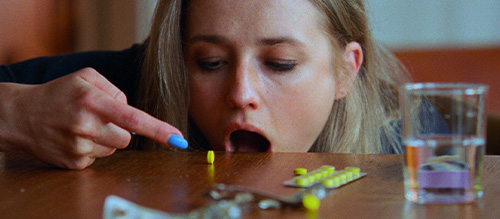Sick of Myself (2022)
Director: Kristoffer Borgli
Screenwriter: Kristoffer Borgli
Starring: Kristine Kujath Thorp, Eirik Sæther, Elisabeth Bech Aschehoug, Sarah Francesca Brænne, Anders Danielsen Lie, Fredrik Stenberg Ditlev-Simonsen, Guri Hagen Glans, Steinar Klouman Hallert, Andrea Bræin Hovig, Matilda Höög
To say that Kristoffer Borgli’s Sick of Myself is a study of rampant narcissism would be, in many ways, a considerable understatement – the film goes beyond this to deliver a piercing satire which considers modern society’s obsession with idolisation and its glorification of the victim mentality. Speaking at the film’s premiere at Cannes, the Norwegian writer-director clarifies that each of the film’s characters are questioning their purpose in our contemporary world: ‘most characters in the film are privileged, and they don’t have a real story or a struggle. They don’t have a purpose in life, and they’re trying in this modern life to figure out: how do I find my purpose, how do I get recognised, how do I get seen, how do I get attention?’ Signe (Kristine Kujath Thorp) just so happens to have ‘the worst plan of all time to respond to this.’
For admirers of Joachim Trier’s Oslo-set dramedy The Worst Person in the World, the premise of Sick of Myself may sound all-too-familiar – after all, following a self-absorbed Nordic millennial as she navigates a journey of self-discovery was so last year. Here, however, Borgli has created the true worst person in the world in Signe, a shamelessly self-obsessed barista who finds herself on a pathway to mediocrity, trapped in a toxic relationship where the limelight is relentlessly stolen by her arrogant and egotistical boyfriend, Thomas (Eirik Sæther).
Signe craves attention and recognition, not only from Thomas, but from her circle of friends, her colleagues and even from strangers that she has only just met for the first time. So, when Thomas finds modest success through his latest artistic installation, Signe is enveloped by an all-consuming envy, her bitterness at his achievement dictating her every waking thought. Signe finds every pleasure in continually bringing Thomas down a notch, revealing to their friends that his exhibition is not actually on display at the main gallery, but at a smaller pop-up offshoot, which really is not so spectacular after all. As the couple battle for relationship supremacy, it becomes clear that their hostility for one another is palpable, filled to the brim with constant belittlement as the need to gain one-upmanship grows in intensity.
The blatant vanity and brazen pride that both Thomas and Signe exude provides the only conceivable reason that they’re still together – whatever affection they may have shared has long dissipated, and both are clearly too stubborn to give in and end the relationship first, such is their contempt for one another. Eventually, Signe makes a drastic decision to wrench back attention from Thomas – she begins taking the illegal, skin-afflicting Russian drug Lidexol in a bid to win herself some sympathy.

Waking up in hospital, looking almost mummified by the bandages wrapped around her face and body, Signe laps up the concern of Thomas and her friends. Borgli has cited the recent emergence of society’s romanticisation of suffering as one of his major inspirations for his work – Signe’s goal to hog the limelight becomes increasingly mad, and never once does Signe reflect on her decisions to question whether she is being reasonable. It feels almost wrong to laugh at her self-mutilating plight, but it’s difficult not to as Signe continues to take any drastic action that’s necessary to remain relevant.
It’s easy to get completely lost in Kristine Kujath Thorp’s utterly captivating turn as Signe – her slow descent into utter madness almost seems relatable for a moment, but she becomes increasingly erratic and evermore unpredictable in her need for approval. By the end, the laughs have run dry as her increasingly ridiculous, attention-grabbing antics become so uncomfortable that her performance becomes outright disturbing.
Suffering life-changing deformities, Signe still fantasises that her story will be immortalised in a best-selling novel, such is her delusion. Izzi Galindo’s disturbing prosthetics work renders Kujath Thorp completely unrecognisable, her body so maimed that even body horror masters Julia Ducournau and David Cronenberg would be proud. As the credits roll, it feels almost impossible that Signe’s plight had been met with any laughter at all. Reflecting on the comedic elements of his film, Borgli stated: ‘I don’t think any of us working on this film has ever been more serious about making something funny.’
In the end, Signe is the architect of her own downfall. And, as such, Sick of Myself provides a sharp caricature of modern millennial values, cutting right to the heart of a culture that offers dangerous motivation for the veneration of victimhood.
Score: 18/24
Written by Jake Gill
You can support Jake Gill in the following place:
Twitter – @Jake95Gill


